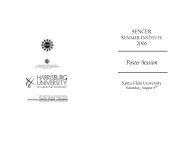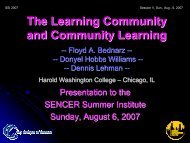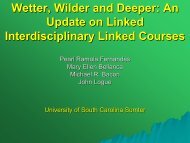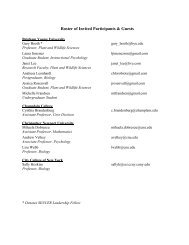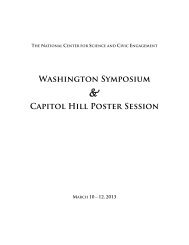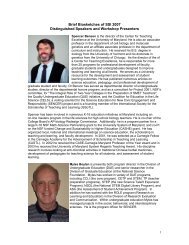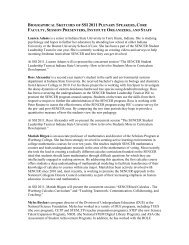Biosketches of invited speakers, Institute facilitators, and ... - SENCER
Biosketches of invited speakers, Institute facilitators, and ... - SENCER
Biosketches of invited speakers, Institute facilitators, and ... - SENCER
You also want an ePaper? Increase the reach of your titles
YUMPU automatically turns print PDFs into web optimized ePapers that Google loves.
As director <strong>of</strong> the <strong>Institute</strong> for Teaching <strong>and</strong> Learning, Helen is engaged with research on reflective <strong>and</strong><br />
critical thinking, assessment <strong>of</strong> general education <strong>and</strong> students’ perspectives <strong>of</strong> academic advising. She<br />
serves as senior personnel for an NSF CCLI Phase II grant to implement <strong>SENCER</strong> pedagogy in first-year<br />
learning communities <strong>and</strong> the integration <strong>of</strong> citizen-science across the curriculum.<br />
At SSI 2010, Helen will co-present the concurrent session “Field Reports: Transforming Science<br />
Education at Madonna University <strong>and</strong> <strong>SENCER</strong> in a First-Year Learning Community—Questions to Ask<br />
Yourself.”<br />
Carol Reeves is pr<strong>of</strong>essor <strong>of</strong> English at Butler University in Indianapolis. She has a bachelor’s <strong>of</strong> art <strong>and</strong><br />
a master’s <strong>of</strong> art in English from Texas Tech University <strong>and</strong> a PhD from Texas Christian University. She<br />
began her post-graduate career in 1989 at Butler where she has run writing programs <strong>and</strong> where she is<br />
now the director <strong>of</strong> the Butler Program in Science, Technology <strong>and</strong> Society. Her research <strong>and</strong><br />
publications have focused on how scientists communicate new, revolutionary or iconoclastic ideas to their<br />
peers <strong>and</strong> how scientific findings are communicated to the public. Her research has led to articles about<br />
the language <strong>of</strong> AIDS, the rhetorical dimensions <strong>of</strong> Mad Cow Disease <strong>and</strong> the language <strong>of</strong> the human<br />
genome. Currently, she is examining the language <strong>of</strong> climate change over the past fifty years. Her<br />
teaching includes courses on rhetoric <strong>and</strong> science, literature <strong>and</strong> medicine, medical <strong>and</strong> environmental<br />
writing, <strong>and</strong> utopian fiction. Last year, she was named the Mortar Board pr<strong>of</strong>essor <strong>of</strong> the year in her<br />
college by Butler students. As director <strong>of</strong> the STS program at Butler, Pr<strong>of</strong>essor Reeves has been working<br />
with other faculty to develop two major tracks within the program – health <strong>and</strong> community studies <strong>and</strong><br />
environmental studies. She is new to <strong>SENCER</strong>, but most <strong>of</strong> her courses involve various levels <strong>of</strong><br />
experiential learning leading to student-initiated research <strong>and</strong> writing projects that serve the Indianapolis<br />
community. For example, several STS majors are currently working with a team made up <strong>of</strong> public health<br />
nurses, physicians, <strong>and</strong> communications specialists to increase public awareness <strong>of</strong> the need for universal<br />
HIV testing <strong>of</strong> pregnant women in order to prevent perinatal infections, which have risen 400% in the last<br />
two years in Indiana. Her Literature <strong>and</strong> Medicine course linked individual students to an HIV/AIDS<br />
service organization where they interviewed case workers about their caseload <strong>and</strong> their views about HIV<br />
prevention campaigns.<br />
At SSI 2010, Carol will present a concurrent session on “The Call <strong>of</strong> Story <strong>and</strong> the Pre-Med Major.”<br />
Eliza Jane Reilly is the director <strong>of</strong> the Phillips Museum <strong>of</strong> Art <strong>and</strong> past director <strong>of</strong> the Center for Liberal<br />
Arts <strong>and</strong> Society at Franklin & Marshall College, where she also teaches in the American studies<br />
program. Before coming to Franklin & Marshall in 2003, she was director <strong>of</strong> programs in the Office <strong>of</strong><br />
Science, Health, <strong>and</strong> Student Engagement at AAC&U, working on the <strong>SENCER</strong> <strong>and</strong> PHHE programs.<br />
From 1998 to 2003 she also served as the executive director <strong>of</strong> the American Conference <strong>of</strong> Academic<br />
Deans, a national organization <strong>of</strong> chief academic <strong>of</strong>ficers <strong>and</strong> other academic administrators committed to<br />
improving undergraduate liberal education.<br />
Eliza received a master’s in art history <strong>and</strong> a doctorate in American history from Rutgers University. She<br />
is a senior scholar with the <strong>SENCER</strong> project, where she serves as general editor <strong>of</strong> the <strong>SENCER</strong> model<br />
series. She also is co-editor <strong>of</strong> the peer-reviewed, web-based publication Science Education <strong>and</strong> Civic<br />
Engagement: An International Journal.<br />
At SSI 2010, Eliza will preside over the plenary session “Staying on the Cutting Edge.” She will<br />
co-present the concurrent sessions on “The Public Health Major in an Undergraduate Stetting” <strong>and</strong><br />
“Disseminating Your Work: The <strong>SENCER</strong> Journal <strong>and</strong> Model Series.” She will also be a panelist on the<br />
work sessions “Building a Community <strong>of</strong> Practice” <strong>and</strong> “Campus-Wide Implementation.”<br />
67



